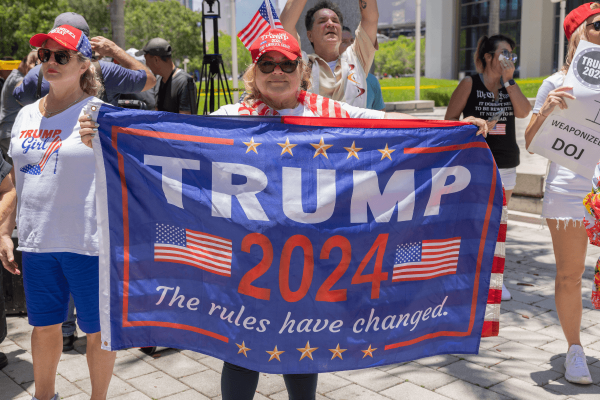If I’d been the moderator on Tuesday’s debate between Vice President Kamala Harris and former President Donald Trump, the first question would have been this: Will you accept the results of a free and fair election?
According to most political commentators, Harris won the debate, her first against Trump. Throughout the 90-minutes, Trump often appeared angry and unhinged, spreading a flurry of falsehoods while Harris appeared poised and commanding, often putting Trump on the defensive about his record. Both candidates repeatedly dodged moderators’ questions and spent significant time attacking their opponent; when Harris taunted Trump about the size of his rallies and his reputation among world leaders, Trump took the bait and responded exactly as we have come to expect: with bluster.
But while assessing who wins a debate can be fairly subjective, determining who wins the upcoming election can’t — or shouldn’t be. As we’ve learned since 2020, confidence in our electoral system has increasingly become a partisan issue, with over 70 percent of Republican voters believing that President Joe Biden’s win in 2020 was illegitimate, a belief fueled by the pernicious, big lie that the election was stolen due to widespread voter fraud. Changing these numbers and restoring bipartisan confidence in our electoral system will require real work — and leadership from our elected officials.
It will also require voters to care. Though polling shows issues like the economy, immigration, and abortion — not democracy — are among top issues for most voters, I believe voters, especially voters of faith, need to listen carefully to how Trump and Harris talk about the freedom to vote, the process of administering the election, adjudicating the results, and all the other rules that govern our elections. After all, how well we defend our democracy will impact every other issue we care about, including poverty, climate change, foreign policy, and so much more.
Which brings me back to the question I wish moderators had asked. True, it’s confounding that accepting the basic rules of our electoral system isn’t a given for presidential candidates; can you imagine playing a competitive game against an opponent who refuses to play by the same rules or accept defeat if they lose? Yet, over the past four years, that’s exactly what we’ve seen from Trump and his allies — and Tuesday’s debate was no different.
When moderator David Muir asked Trump if there was anything he regretted about what he did on Jan. 6, 2021, Trump downplayed the violence of those who stormed the U.S. Capitol and deflected his own responsibility for it. He still, almost four full years later, won’t acknowledge that he lost the 2020 election — and he certainly didn’t commit to conceding defeat if he loses this November. After Harris claimed world leaders consider Trump “a disgrace,” Trump pointed to Hungarian strongman Viktor Orbán as an example of a foreign leader who admires Trump’s leadership, an alarming choice given that Orbán has slowly transformed Hungary into an increasingly authoritarian state.
Harris, by comparison has consistently called for legislation to protect and guarantee the freedom to vote for all Americans. She has been outspoken about the ongoing threats to our democracy posed by Jan. 6 and political extremism. During the debate, Harris said, “For everyone watching, who remembers what January 6th was, I say, we don’t have to go back. Let’s not go back. We’re not going back. It’s time to turn the page.”
I hope it’s obvious why I care about these issues: As a Christian who loves this country, I believe that our democracy, as imperfect as it is, is the best system to promote the common good, resolve our disputes, protect minority rights, and co-create a nation in which everyone can thrive. At the heart of this system is our agreement that voting — not violence or intimidation — is how we ultimately resolve our political disagreements. This is what gives our entire system of government its legitimacy: a government that is “by the people, for the people,” drawing its power from the consent of the governed. In this democratic ideal of “one person, one vote,” I hear echoes of the biblical concept of imago dei, which states we are all created in God’s very image and therefore possess equal and inherent worth.
When we strengthen voting rights, I see us moving toward a nation where we uphold the equal worth of all people. Conversely, as we watch renewed threats to voting rights in many states, I see our nation grappling with whether we really believe all people should have equal say and equal agency. These threats include weakened voting rights protections, voter suppression in some states, and disinformation campaigns. The attempts to reverse the 2020 election have shown us the power of a baseless lie, repeated by enough people with influence and power, to shake confidence in our democracy.
In Tuesdays’ debate, I saw two candidates who have vastly different values and visions for our nation. But it was deeply disconcerting to me that only one candidate embraces the core rules and norms of our democratic system, which include accepting the results of an election if they don’t win.
I think there are many important issues at stake in this election. But regardless of who wins, I am praying for and working to ensure that the election is free, fair, and safe for all voters. No matter who becomes president or which party controls Congress come January 2025, I want us to share a sense that everyone played by the same rules and whoever won the election did so fair and square.
We can realize that vision first by encouraging every eligible voter to raise their voice by casting their ballot for the candidate who best aligns with their values, priorities, and vision for the country. Through efforts like Faiths United to Save Democracy, which Sojourners co-leads, I’m working alongside a growing multi-faith and multi-racial movement of faith leaders to train poll chaplains and peacekeepers in key states. We hope they will provide a moral presence at polling sites, serving as a counterweight to any efforts at disinformation, intimidation, or even violence that seeks to deny or suppress people’s vote. We will also be working vigilantly alongside other faith and secular partners to ensure that every vote is counted and prevent any effort to sabotage or undermine the election results.
We know our democracy will continue to need significant work to extend its promise equitably to everyone, but in order to improve it and more so to transform it, we first have to protect it. That, much more than whose rallies draw bigger crowds, is what’s at stake between now and Nov. 5.
Got something to say about what you're reading? We value your feedback!







